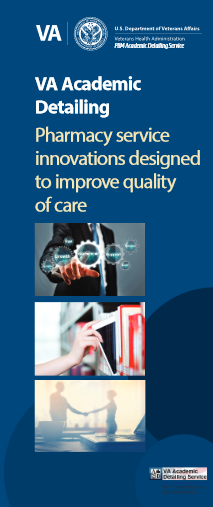 SALT LAKE CITY — For academic detailers, acting as change agents is nothing new. It’s central to their work as clinical pharmacy specialists and educators. This year, the academic detailers at the VA found their transformative role included a new and urgent responsibility—increasing provider comfort with telehealth technology.
SALT LAKE CITY — For academic detailers, acting as change agents is nothing new. It’s central to their work as clinical pharmacy specialists and educators. This year, the academic detailers at the VA found their transformative role included a new and urgent responsibility—increasing provider comfort with telehealth technology.
While the VA has long led the nation in its use of telehealth, COVID-19 dramatically accelerated the pace of adoption. The VA has used a variety of telehealth systems to connect the country’s largest healthcare system with patients in rural areas, at substantial distance from VA facilities or in need of care from specialists not available locally. With the pandemic, that mission expanded to making care available remotely to more than nine million veterans as VA facilities restricted access to patients infected with SARS-CoV-2 and other critical issues.
The system rose to the challenge. “VA telehealth enabled veterans to access care at a time and place that fit into their lives,” Kevin Galpin, MD, executive director of the VA’s Telehealth Services, told U.S. Medicine. “Telehealth increased more than 400% between January and July,” including connections between community-based outpatient clinics (CBOCs), telehealth hubs and VAMCs, as well as between homes and clinics. The number of telehealth visits conducted with veterans in their homes rose 15-fold during that period. For the week of Sept. 13 to Sept. 19 alone, veterans connected to care virtually for more than 175,000 visits.
Still, the sudden shift to remote delivery of care was not without its problems. “There were some challenges with lack of equipment or bandwidth, but most issues were more educational than operational in nature,” Galpin said. “Providers might start a visit with their laptop on their lap, so patients are viewing them from a less than flattering angle. They might have a bright light behind them that causes silhouetting, where the patient can’t see their face at all.”
That’s where the academic detailers, now operating remotely as e-detailers, stepped in.
“Academic detailing is a proven method in changing clinicians’ behavior when addressing a difficult medical problem in a population,” said VA Under Secretary of Health for Discovery, Education and Affiliate Networks Carolyn Clancy, MD. Usually detailers help providers understand risks arising from their prescribing practices and educate them on ways to minimize those risks for patients. Within the VA, detailers have focused on issues of opioid safety—the Comprehensive Addiction and Recovery Act, opioid use disorder, overprescribing opioids, co-prescribing with benzodiazepines and increasing prescriptions for naloxone.
Connecting Remotely
As the pandemic spread across the country, detailers had to connect with providers remotely to address topics that they would have brought up during in-person visits, explained Jonathan Hoffman, PharmD, who joined the VA’s academic detailing service as a program manager for VISN 19 in early 2018.
“As part of [an e-detailing] pilot, the expectation was that most of my engagement with providers would be done virtually,” he told U.S. Medicine. “I did some traveling maybe three weeks a quarter. Initially those face-to-face meetings were critical for building relationships and obtaining the trust of providers.” He found the response from prescribers “pretty positive from the get-go” and that providers and other team members quickly became comfortable sharing through video.
Hoffman and his colleagues in academic detailing at the VA analyzed how their roles changed during the pandemic in a recent article in the Journal of the American Pharmacists Association.1
“When working through the adoption of virtual technology for the delivery of medical care, providers may need time and nontraditional delivery of ‘evidence’ before eliciting signals for change,” they wrote. “Academic detailers are well suited for this role and can develop plans to help address provider discomfort surrounding the use of telehealth technology.”
Some of that education and provision of evidence occurred naturally. As the detailers discussed issues with providers, they demonstrated how the system worked. By using telehealth to talk with the clinical pharmacy specialists, other providers acclimated to a new way of consulting that could transfer to patient care.
The detailers facilitate that transition as well. “The VA had the foresight to incorporate video visits into its treatment modalities,” Hoffman said. “We use VA Video Connect to reach providers and engage them so they can deliver care through virtual technology to veterans.” Sometimes that assistance is as direct as explaining how to use the Video Connect system to meet with patients; sometimes it’s demonstrated through the discussion of materials available to educate patients on use of naloxone. For the e-detailers, either way, it’s all about improving the quality of care for veterans.
The pandemic clearly demonstrated the flexibility and acumen of academic detailing pharmacists. As the authors said, they are “ambassadors of change, serving an important role navigating the evolution of health care in response to emergent public health crises and helping define the norms of care delivery to follow.”
- Hoffman JD, Shayegani R, Spoutz PM, Hillman AD, Smith JP, Wells DL, Popish SJ, Himstreet JE, Manning JM, Bounthavong M, Christopher MLD. Virtual academic detailing (e-Detailing): A vital tool during the COVID-19 pandemic. J Am Pharm Assoc. 2020 July 31;S1544-3191(20)30318-6. doi: 10.1016/j.japh.2020.06.028. Online ahead of print.

